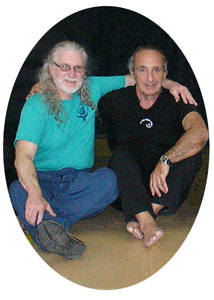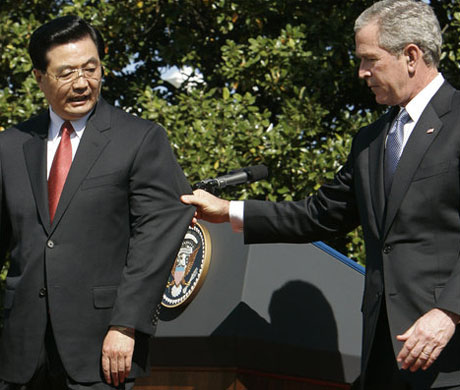About good leadership

Erle Montaigue-Walter Marsoul
It was impossible not to learn from him.
There is a difference between a manager and a teacher.
Many so-called teachers are managers. Their vision is in the present.
Management is nothing more than motivating other people to say yes.
A teacher says no. His vision is beyond the present.
His leadership is based on the spiritual quality of saying no.
A teacher is a teacher. A master is a master.
A master is "a finger that points to the moon".
Tswang Tse
It is difficult for most beginners to judge the quality of instruction they are receiving.
Much of what is available for public consumption heavily depends on marketing, romantic or dramatic gestures taking the place of real stuff.
The general public may be impressed by showmanship.
In the internal martial arts there are two kinds of relations : students and disciples.
A REAL MASTER only points to the moon.
(keep in mind that the master is not the moon itself).
In this business-oriented world where 'Tai Chi-Chi Kung masters' are a dime in a dozen,
we can cash in on a deal by paying for a certificate proclaiming you are a "sifu" (or something like that)
or a master (or something like that). A businessman can buy his way through anything.
Tai Chi is difficult, there are very few masters, why are there so few of them ?
Master Erle Montaigue answered that question : "Because Tai Chi Cuan is difficult". A master is a leader,
effective leadership requires clarity of mind.

The most competent leaders
are the most competent followers...
A leader is not afraid of chaos,
in all chaos there is a secret order.
Leadership means giving of yourself to inspire others to go
where they don't necessarely want to go.
It means to inspire others to get closer to the essence,
defining themselves, as opposed to being defined by others.
Both teachers and leaders are role models.
Teachers are more role models when they learn than when they teach.
It's so easy to say yes.
Real teachers simply say no... and leave footprints in our hearts.
A vision is not a vision unless it says no to some ideas.
Saying no to some ideas is one thing,
saying no to a person is another thing.

Photo : The New York Times
Losing face.
The Chinese concept of "Face".
Our Western concept of "face" is self-oriented, individualistic and "facebook oriented". Nowadays most Westerners suck at
self-promotion, if we want to stand out from the crowd, we need to sale ourselves, to build a network of people who support
our ideas (Einstein said something along the lines of "a person is lucky to have one original idea in a lifetime").
Chinese thinking is different from Western global twitter-exhibitionism, often they smile, and generally they don't express
their personal feelings. The own ego is of little importance, menstrual cycles aren't twitter-hot spots and the age of
their dog is of no importance unless he's a cheese. Most Chinese aren't big on adapting the whole Universe on their
menstrual cycles regardless of how productive, contra-productive or damaging the results may be. Exhibitionism is now big
business, when a person shares too much information on facebook, whether it's to draw attention or to make him/her feel
important.
The Chinese "concept of face" goes beyond our Western "small faces-concept", it has nothing to do with facebook. "Having
face" means one who cultivates morality so that his or her conduct will not lose others face. The person having face is
expected to be communally conscious, Chinese concept of "face" is group-directed, other-oriented, family-oriented,
nation-oriented with the emphasis on the collective. One of the worst things to do is "to lose face". The Chinese "concept
of face" is about interaction, 'having face', 'losing face' and 'shame' isn't just personal feelings, it's a relationship
based thing. In the martial sense face is a partner-oriented complex system of giving and receiving, and saving face just
means avoiding potential embarassement. To save the face of your opponent you have to be much more skilled that you can
defeat your opponent. A common virtue in China is that of modesty, you give face by elevating people. Elevating your
partner leads to not only giving face to another but also to gain face yourself. So giving face is also another way of
gaining face.
Seeing the world in terms of black-or-white, in which choices seem clear tend to black-or-white thinking. Black-or-white
thinking is how it should be, but there is no black-or-white situation, it's all part of life. Remember that the concept of
Yin and Yang has nothing to do with black-or-white, it is about change, relation and interaction. In the same way the
Chinese concept of face is not about black-or-white, neither is it about what the situation and the relationship calls for.
Taoist ethics has never been based on good or bad, instead they're more based on the circumstances of the moment
(situation-ethics). Chinese raise 'maintaining face' and 'avoiding losing face' to an art. Saying no to something, saying
no to some ideas is one thing, saying no to someone is another thing. We can contradict that person in front of someone and
cause that person "to lose face". Even the act of "saying no" to somebody can a person lose face. So most Chinese avoid
Yes-or-No questions and black-or-white situations to avoid putting someone in a position where they might have to give a
"Yes-or-No answer". They don't want to hurt someone's feelings.
Finally "face" means good intelligence management, human intelligence gathering by means of interpersonal contact. It means
dignity, respect, tolerance, honor, prestige and reputation : "having face" (reputation), "having bad face" (when face has
been lost).
Effective leadership requires clarity of mind.
A clear minded leader is indifferent to glory and blames,
flattery and criticism.
A leader is keen on knowing reality, now matter how.
Such leaders are not easy perturbed.
Like water they are able to regain their balance in no time.
A leader has no intellectual or moral rights, no secret techniques.
Real leaders will respect you, even when your decisions are not in your interest.
They stand back, and allow you to make decisions
without trying to influence the process.
You are facilitating another person's proces. Do not intrude, do not control.
Do not force your own needs and insights onto the foreground.
If you do not trust a person's process, that person will not trust you.
John Heider
 Taoist classics: About good leadership
Taoist classics: About good leadership